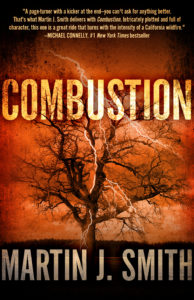Martin J. Smith, Pittsburgh native and former staffer at the Pittsburgh Press, is coming to Mystery Lovers on Tuesday, September 20th!
Smith is the Edgar Award-nominated author of the Pittsburgh-set “Memory Series,” including Time Release, Shadow Image, Straw Men, and The Disappeared Girl. He also has written three nonfiction books, including 2012’s The Wild Duck Chase, upon which Animal Planet’s award-winning documentary film The Million Dollar Duck is based.
Smith’s latest novel, Combustion, is a “page-turner with a kicker at the end—you can’t ask for anything better. Intricately plotted and full of character, this one is a great ride that burns with the intensity of a California wildfire.” — Michael Connelly, #1 New York Times bestseller
From the Publisher: “The dry season has hit the Inland Empire of California, depleting the ponds and revealing the muddy grave of Paul Dwyer. From his mansion on the hill, Dwyer lorded over Los Colmas, a small town that he aspired to make big by building mansions for wealthy LA commuters. Some viewed him as a savior, providing construction jobs for locals. Others believed he was ruining their beautiful, close-knit town. But who was angry enough to murder him?”
Chapter 1
 The closing credits were still scrolling up the screen of Starke’s iPad when his cell phone jolted him straight up in bed. What time had he finally fallen asleep? He scanned the darkness for some sign of the time.
The closing credits were still scrolling up the screen of Starke’s iPad when his cell phone jolted him straight up in bed. What time had he finally fallen asleep? He scanned the darkness for some sign of the time.
His phone chirruped again, like a cricket trapped somewhere in his one-bedroom cave. Where’d he left it? He moved the tablet to the side, slid his feet off the twin mattress and onto the worn carpet, and stood with a riotous popping of cartilage. He was naked. The compressor of his window air-conditioner had been busted for months. Since the apartment was above the Suds-Your-Duds laundromat on the ground floor, the dryer vents leaked warm, moist air through the ductwork. It was like living in somebody’s armpit, but he just hadn’t had the energy to move, or do anything besides work, since Rosaleen.
Chirrup.
The pocket of his jeans? He found them draped over the single folding chair in his kitchen, but no phone. He glanced at the microwave clock. Nothing good could come of a phone call at 4:43 in the morning.
The third ring drew him to the counter, where the phone glowed beside his Toast-R-Oven. He unplugged it from its charger and carried it to the refrigerator, opening the fridge door to enjoy the cool air. Good thing he wasn’t hungry. Not much you can do with condiments and half a sixer of Newcastle.
He cleared his throat and answered. “Ron Starke.”
Donna Kerrigan’s voice brought him fully awake, like a nearby screech of brakes or a late-night smoke alarm.
“He’s dead,” she said.
Starke reached for a Newcastle and pried off its cap. Man, it was hot. “A cheerful good morning to you as well, Chief Kerrigan.”
“I know it’s early, but I need you at the morgue.”
“You’re sure it’s him?”
“Ninety percent. I want a fast start on this.”
Starke had a flickering thought: TV news would be all over the story, and Paul Dwyer’s family shouldn’t find out that way. While he was no fan of Shelby Dwyer, the new widow deserved better. He took a long pull, certain the delay was spiking the blood pressure of a woman whose smile he had yet to see during her first few months as his boss. She was a puzzle.
Finally: “OK, what do we know so far?”
“Body dump. In one of the ponds where they’re building that residential tract, the big one—Villa Cordero, I think it’s called.”
One of Dwyer’s own developments, Starke thought. Interesting.
“Some high school kids partying up there last night found him,” Kerrigan said. “Condition puts DOD at weeks, not days, meaning he’s been dead since right after he disappeared. That’s all we know at the moment. But you need to roll now. They’re waiting for you to start the exam.”
“The notification?” Starke said. “They have a daughter, a teenager. Somebody needs to tell Mrs. Dwyer soon.”
“Agreed.”
He remembered the unexpected note Shelby had written him two years before. It hadn’t helped. But given their complicated history, he’d appreciated the gesture.
“I’ll swing by their house on my way to the morgue,” he said.
“No.”
He waited a long moment for Kerrigan to elaborate. She didn’t.
“What’s the media situation?” he said at last.
“I’m sure they heard the radio traffic.”
“Then I really think someone needs to—”
“I’ll go,” Kerrigan said. “You need to be there for the exam. I can handle the notification. Widow’s name again?”
“Shelby.”
Starke pressed the cold bottle to his forehead, then dumped the rest of the brown ale into the sink. He set the empty bottle on the counter. Kerrigan was probably right. He needed to be there for the initial examination of Paul Dwyer’s body. For a lot of reasons, he also wanted to handle the notification, to look into Shelby Dwyer’s eyes at the moment she heard the news for any sort of tell. Both things needed to be done now, and he couldn’t be in two places at once.
“Just—don’t wait, OK?” he said. “Get there before the satellite trucks.”
“Walking to my unit now,” Kerrigan said.
Starke hoped what he was about to say wouldn’t sound patronizing, but he didn’t want to leave it unsaid. “This one’s wide open, you know.”
“Meaning?”
“Watch her carefully.” This time, Kerrigan took her time responding.
“You think the wife knows more than she’s saying?”
He hoped Shelby didn’t. He hoped her husband’s murder was a business deal gone bad, or a carjacking, or a life insurance hustle, or a jilted lover’s revenge. He hoped Paul Dwyer had some sort of secret life that would explain it all and provide a logic for his death. Because, more than most, he knew death without logic was the worst death of all.
“It’s just—” Starke swallowed hard. “It’s wide open.”
“Never met a woman without secrets. On my way,” Kerrigan said, and ended the call as abruptly as she’d started it.
Starke closed the refrigerator door slowly, erasing its wedge of light until he was alone again, sweating naked in the dark.
Published courtesy of the author, who reserves all rights to this excerpt.

























